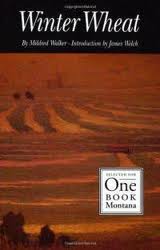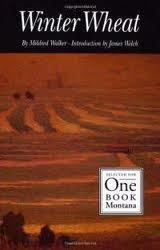Winter Wheat: a vivid sense of place, in 1940's Montana
 “September is like a quiet day after a whole week of wind.”
“September is like a quiet day after a whole week of wind.”
The opening line of Mildred Walker’s most popular novel, Winter Wheat, sets the tone for the metaphors of the farming and natural worlds that bring this book to life.
After selling the dry land wheat crop in the early 1940’s at a decent price, Ellen Webb’s parents can afford to send her away for her first year of college. She goes back east to school– Minnesota is east of Montana anyway, and falls in love with Gil, a wealthy and cultured senior. Ellen returns to the farm and is quickly back to helping with farm work, although she views everything differently now that she is in love. After much anticipation, Gil comes to visit, and then leaves again. When a storm brings hail, the wheat doesn’t bring enough money for Ellen to return to school, and she takes a solitary position living and teaching in a remote one-room school house.
Ellen’s parents, a World War I veteran with shrapnel injuries and the Russian bride who has been nursing him since he was injured on Armistice Day, have a complicated relationship that Ellen has always misjudged. Unsure of where she fits in the world, Ellen struggles to understand her parents and herself, and to make sense of the past and her future. James Welch, as the editor of this reissued edition of Winter Wheat notes, “It is a story about growing up, becoming a woman, mentally, emotionally, spiritually, within the space of a year and a half. But what a year and a half it is!”
Mildred Walker, daughter of a teacher and a Baptist minister, wrote since her early teens. She married a surgeon-physician and achieved her Master’s degree while her husband practiced medicine in Michigan. When the family moved to Great Falls, Montana, Mildred Walker hired household help so she could pursue her writing career. She observed the lives of the people her husband treated, and absorbed the natural setting of Montana.
She wrote about her personal philosophy: “I feel strongly about the need to oppose materialism in both our national and individual life--the importance of the freedom of every individual, but the need for a better understanding of the nature of freedom--the need to dethrone success as the American ideal and substitute for it a creative quality in our daily living.”
As a college assignment in Winter Wheat, Ellen struggles to reflect on her life and write autobiographical essays in some of the most revealing and well written scenes I’ve ever read. In our book discussion, talk centered on the reality of hard manual labor, the changes that equipment like the combine have brought to farming, and the experience of life in tune with crops and weather and the natural world. We also speculated on what Ellen would do next – the book’s ended is satisfying, but somewhat open ended.
Winter Wheat was the April selection for the library's Literature with Lunch Book discussion group. Upcoming book discussion selections are announced in advance at http://calendar.tscpl.org/ - we meet on the second Monday of each month at 1:30 pm. Everyone is welcome to attend.













